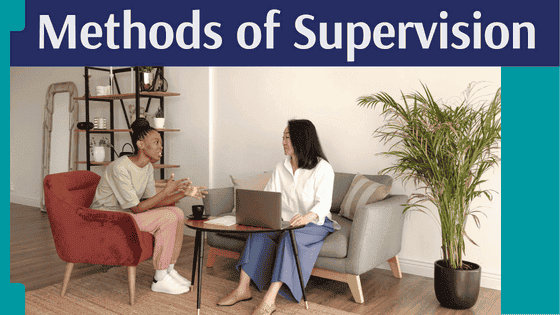
Methods of Supervision
How are you, as a supervisor? This is a real question. Maybe an odd one, but a real question for an article on methods of clinical supervision. "Methods" are thought of as techniques we employ as a supervisor. While that is part of methods, supervision is multifaceted and involves other aspects for success. Method, paraphrased from the Merriam-Webster dictionary definition, is a procedure, way, or process for doing something. Therefore, methods of clinical supervision are not just specific techniques, such as "if I do … then …. will result". Methods include a process or practice of what is done to reach the goals of supervision. If you understand the what of supervision and the goals or purpose of it, then methods is the how or the intentional process of providing supervision, considering and combining techniques and our approach.
Clinical supervision increases professional development and competence. There are general goals and specific goals for each supervisee. Some common, general goals are increasing knowledge and developing skills, orientating to the profession and building professional identity, and gatekeeping for the profession. The result is having developed a person qualified for independent practice with diverse populations in various settings.
Accomplishing the goals of supervision depends on methods. There are specific techniques in methods. These may include such things as building a collaborative relationship to foster learning and development, skill demonstration, modeling, teaching, monitoring (live observation, review recordings, and documentation), evaluation, feedback, Socratic Method, interpersonal process recall, behavioral rehearsal, identifying and utilizing complex processes such as transference/ countertransference and parallel process, and case consultation. Then there is the process. This varies on how we are, such as our style, our approach, our model of supervision, as well as supervisee factors.
We practice in ways and styles that build competence and promote independence. Think of everything supervisees need to know and how they learn and develop. Let’s use two supervisor tasks and share examples of methods- the process of combining techniques and our how.
We start by developing a collaborative relationship in which they feel safe (technique). How do you show up inside that relationship? Are you present, supportive, and encouraging yet challenging, patient, remedial focused (education-minded - expecting issues and deficiencies and doing all you can to teach and provide an opportunity to learn), and have clear, reasonable expectations? (Both questions are examples of the how in the process of methods.)
We help supervisees look for answers, build capabilities and critical, ethical, and clinical reasoning. We do not just instruct, answer their questions, and tell them what to do (technique). Our style may be direct, and our desire may be to be helpful and teach, but that may not be appropriate for all supervisees or certainly for all circumstances or moments in time (process- look at style and process of supervision). Further how examples are: Ask them questions. Perhaps use verbal prompting or the Socratic Method (techniques). Question all they do to explore and increase self-reflection to help them understand their process and reasoning (technique). But not question as if there is a right answer or only one way to do things (process-style). When you do provide suggestions and ideas, think out loud (technique-modeling), so they learn reasoning skills, demonstrate how you might do it (technique-modeling), and allow them to develop their own style by having them practice skills with you (technique, such as behavior rehearsal). Be clear (process- trait, intentional process) about the necessary competencies, knowledge, and skills required and how they will be monitored and evaluated. Use what is recognized in monitoring to provide feedback, process, and discuss (techniques). But think how you do so (process). Think remediation. Remediation is educational focus (process).
So, back to you. How are you, as a supervisor? Not just do you know the techniques of supervision but are you intentional and clear with your process? How do you show up and provide supervision in a way that clearly and intentionally fosters growth and independence to support those involved in the lives of others? Our role as supervisors is necessary and valuable. Take the time to be intentional about your methods and how you are.
**********
We welcome guest columnist Kristin Ryan Easley. Kristin presented the course "Methods of Supervision" for TCI. You can find details about this course here.
About Kristin Ryan Easley:
Kristin Ryan Easley, MS, NCC, LPC, ACS, ‘s practice is Grow Deep Counseling, LLC. She is available for consultation, supervision of supervision, and provides quality CE training for clinical supervision, ethics, and issues related to professional practice. She can be contacted at www.growdeepcounseling.com or
Testimonials
Bridgette Nalumu
Public health consultant, Green and Purple Consultancy Network
Lora Verley
Clinical Therapist, Bayless Integrated Healthcare
Jackie Tanna
Therapist, Region One Mental Health
Jackie Bell-Russell
Therapeutic Behavioral Strategist, Rialto Unified School District